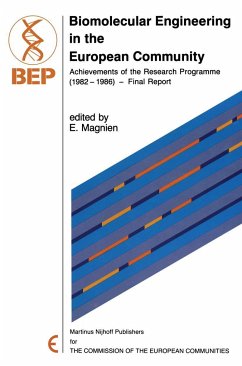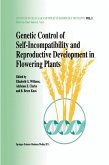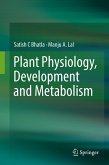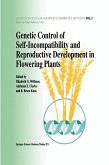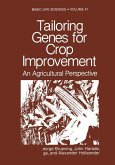E. Magnien (ed.)Achievements of the Research Programme (1982 - 1986) -- Final Report
Biomolecular Engineering in the European Community
Achievements of the Research Programme (1982 - 1986) -- Final Report
Herausgegeben:Magnien, E.
E. Magnien (ed.)Achievements of the Research Programme (1982 - 1986) -- Final Report
Biomolecular Engineering in the European Community
Achievements of the Research Programme (1982 - 1986) -- Final Report
Herausgegeben:Magnien, E.
- Gebundenes Buch
Andere Kunden interessierten sich auch für
![Genetic control of self-incompatibility and reproductive development in flowering plants Genetic control of self-incompatibility and reproductive development in flowering plants]() Genetic control of self-incompatibility and reproductive development in flowering plants223,99 €
Genetic control of self-incompatibility and reproductive development in flowering plants223,99 €![Plant Physiology, Development and Metabolism Plant Physiology, Development and Metabolism]() Satish C BhatlaPlant Physiology, Development and Metabolism111,99 €
Satish C BhatlaPlant Physiology, Development and Metabolism111,99 €![Genetic control of self-incompatibility and reproductive development in flowering plants Genetic control of self-incompatibility and reproductive development in flowering plants]() Genetic control of self-incompatibility and reproductive development in flowering plants243,99 €
Genetic control of self-incompatibility and reproductive development in flowering plants243,99 €![Tailoring Genes for Crop Improvement Tailoring Genes for Crop Improvement]() George BrueningTailoring Genes for Crop Improvement81,99 €
George BrueningTailoring Genes for Crop Improvement81,99 €![Revision of the European Species of Cladophora Revision of the European Species of Cladophora]() Revision of the European Species of Cladophora40,99 €
Revision of the European Species of Cladophora40,99 €![Allelochemicals: Biological Control of Plant Pathogens and Diseases Allelochemicals: Biological Control of Plant Pathogens and Diseases]() Inderjit / K.G. Mukerji (eds.)Allelochemicals: Biological Control of Plant Pathogens and Diseases184,99 €
Inderjit / K.G. Mukerji (eds.)Allelochemicals: Biological Control of Plant Pathogens and Diseases184,99 €![The Family Trichodoridae: Stubby Root and Virus Vector Nematodes The Family Trichodoridae: Stubby Root and Virus Vector Nematodes]() Wilfrida DecraemerThe Family Trichodoridae: Stubby Root and Virus Vector Nematodes240,99 €
Wilfrida DecraemerThe Family Trichodoridae: Stubby Root and Virus Vector Nematodes240,99 €-
-
-
Produktdetails
- Verlag: CEC / Springer / Springer Netherlands
- Artikelnr. des Verlages: 978-90-247-3400-9
- 1986.
- Seitenzahl: 1180
- Erscheinungstermin: 31. August 1986
- Englisch
- Gewicht: 1700g
- ISBN-13: 9789024734009
- ISBN-10: 9024734002
- Artikelnr.: 24537750
Hinweis: Dieser Artikel kann nur an eine deutsche Lieferadresse ausgeliefert werden.
- Herstellerkennzeichnung
- Libri GmbH
- Europaallee 1
- 36244 Bad Hersfeld
- gpsr@libri.de
1. Implementation of BEP.- 2. Scientific and technical value.- 3. Interest for the Community.- 4. The Biotechnology Action Programme.- 5. Role of the Advisory Committees.- Summary Reviews of Scientific Achievements by Research Sectors.- 1. Sector 1 : Second generation bioreactors.- 2. Sector 2.1 : Genetic engineering of virus and cellular genes important in animal husbandry.- 3. Sectors 2.2 + 3 : Genetic engineering of microorganisms important for agro-food industries.- 4. Sector 4 : Genetic engineering of plants and micro-organisms important for agriculture.- Coordination Activities.- 1. Scientific meetings.- 2. Visits to laboratories.- 3. Publications and reports.- Final Reports from the laboratories participating in the research programme.- 1. Development of second generation bioreactors (multi-enzymatic, multiphase or requiring a co-factor) for detoxification and for industrial applications including agro-food applications..- 2. Improved production, by means of biomolecular engineering methods, of substances for: - animal husbandry (particularly vaccines and hormones), - agro-food industries..- 3. Upgrading of plant products, particularly ligno-cellulose, by means of biomolecular engineering methods..- 4. Improvement, by means of genetic engineering, of plants and microorganisms which play an important role in agriculture..- 5. Development of methods for detecting contamination and for the assessment of possible risks associated with applications of biomolecular engineering in agriculture and industry..- Indexes.- 1. Index of project leaders.- 2. Index of keywords.- 3. Index of cities.- 4. Index of contract numbers.
1. Implementation of BEP.- 2. Scientific and technical value.- 3. Interest for the Community.- 4. The Biotechnology Action Programme.- 5. Role of the Advisory Committees.- Summary Reviews of Scientific Achievements by Research Sectors.- 1. Sector 1 : Second generation bioreactors.- 2. Sector 2.1 : Genetic engineering of virus and cellular genes important in animal husbandry.- 3. Sectors 2.2 + 3 : Genetic engineering of microorganisms important for agro-food industries.- 4. Sector 4 : Genetic engineering of plants and micro-organisms important for agriculture.- Coordination Activities.- 1. Scientific meetings.- 2. Visits to laboratories.- 3. Publications and reports.- Final Reports from the laboratories participating in the research programme.- 1. Development of second generation bioreactors (multi-enzymatic, multiphase or requiring a co-factor) for detoxification and for industrial applications including agro-food applications..- 2. Improved production, by means of biomolecular engineering methods, of substances for: - animal husbandry (particularly vaccines and hormones), - agro-food industries..- 3. Upgrading of plant products, particularly ligno-cellulose, by means of biomolecular engineering methods..- 4. Improvement, by means of genetic engineering, of plants and microorganisms which play an important role in agriculture..- 5. Development of methods for detecting contamination and for the assessment of possible risks associated with applications of biomolecular engineering in agriculture and industry..- Indexes.- 1. Index of project leaders.- 2. Index of keywords.- 3. Index of cities.- 4. Index of contract numbers.

